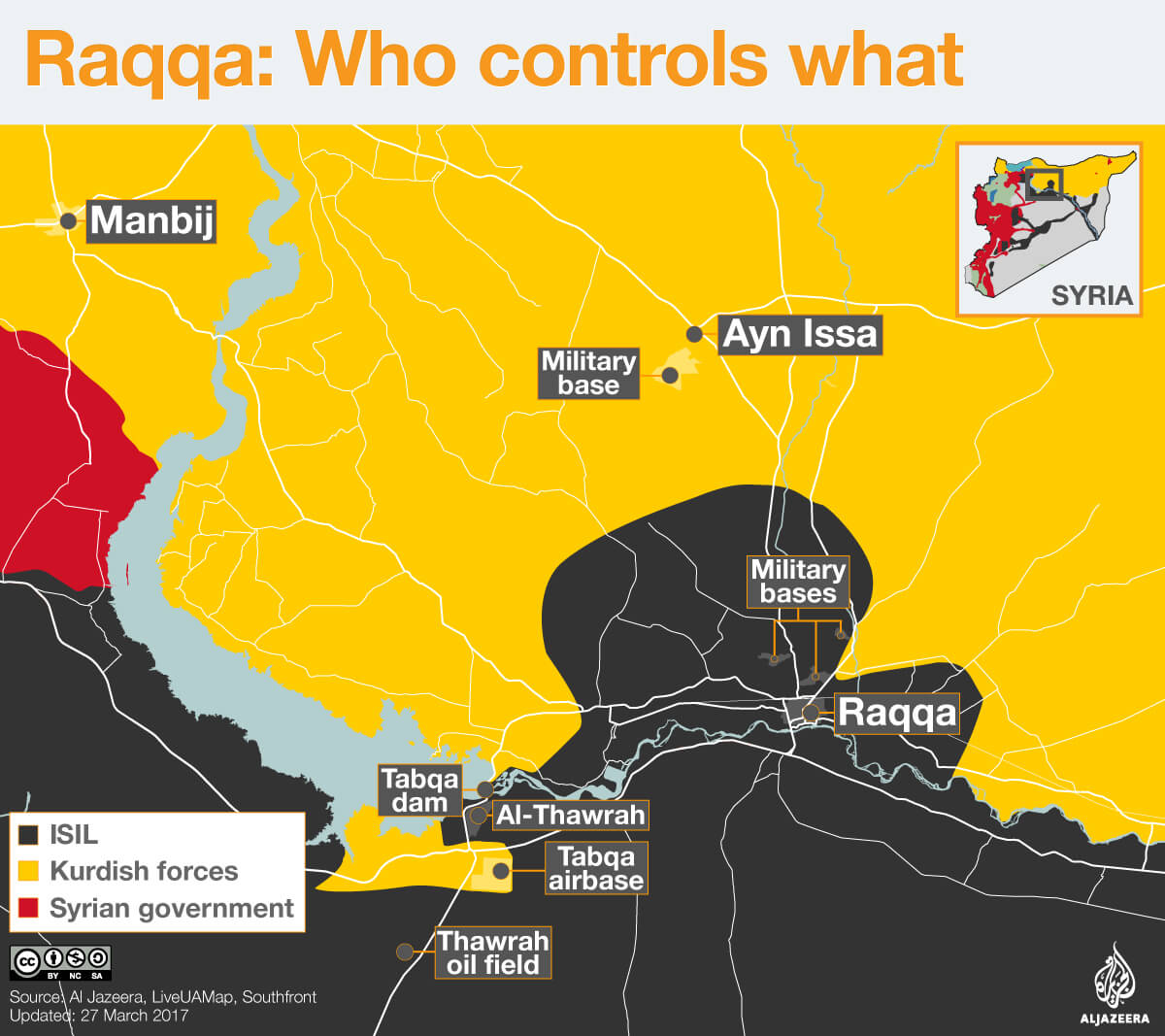The Battle for Raqqa
"Daesh is using boats and ferries to transport weapons and fighters. Do not use ferries or boats, airstrikes are coming."
U.S.-led coalition warning leaflets, Raqqa, Syria
"They tell people ... It is a Battle against Islam, all nations are attacking us and the Prophet says e should be united."
"They are putting psychological pressure on residents."
Hussam Eesa, founder, Raqqa is Being Slaughtered Silently
 |
| ISIL marching in Raqqa, Syria, © AP Photo/ Public Domain |
"I've seen the pictures on the Internet and the control and operations room had been fully burned, which means there is no control of the water coming into the dam."
"This will lead to a real catastrophe, because there is no way from inside the dam to get rid of the water. The situation will escalate because as more cubic metres come in, the situation becomes more dangerous."
"We need someone to interfere to stop this catastrophe, because water will overcome the dam and we don't know what we could do and how many days it would take to collapse - people living along there along the Euphrates are in danger."
Hakam Tawfik, structural engineer who worked on the construction of the dam

The danger of the Tahqa Dam collapsing appears entirely plausible. The dam which supplies the entire region with electricity has been vulnerable to collapse through shoddy design and workmanship for a lengthy period of time. Before the outbreak of civil war in Syria, the dam's engineers took great care in its upkeep and stabilizing work pouring tons of cement into the bulwarks, required on an ongoing basis, since neglected when Islamic State took possession of the dam for the last two years.
Now, water levels have risen to the extent of threatening collapse, since area fighting put the dam out of service. ISIL itself took the precaution of ordering residents of Tabqa and Raqqa to leave, informing them that U.S. airstrikes was responsible for the vulnerability of the dam to imminent collapse.
According to the United Nations, damage to the dam could lead to "massive scale flooding" inundating Raqqa and downstream cities. Haytham Bakkour who operated the dam for a decade as an accredited dam engineer, warned that a "critical overflow" could occur within 30 days if the area was not made safe for staff to enter and work on manoeuvring the floodgates.
Which makes the SDF forces assault against Raqqa all the more desperate. The prevailing situation of ISIL defences are formidable, however, given that landmines and militant checkpoints encircle the city, and within the city itself hundreds of thousands of residents are trapped, useful to Islamic State as a human shield and detaining the opposition forces from a full-on invasion. All males were ordered to wear the traditional ISIL clothing, making it impossible to distinguish civilians from the jihadis.
Thousands of Syrians who had left other areas in Syria for Raqqa live in the streets, in tents, hapless targets of airstrikes as well as any ground fighting. ISIL has erected immense tarpaulins, stretched over city blocks as aerial screens, to shield their activities from air reconnaissance. It is inevitable that civilians will be struck by U.S.-led coalition airstrikes. Fear arises among civilians, never knowing whether a strike will hit them, and knowing that ISIL is on the lookout for "spies" among them.
Most European fighters with ISIL have been evacuated, dispatched to the east, deeper in more securely held ISIL territory. The theory is that their value lies in returning back to the European and North American countries from where they originated, to infiltrat as ticking time bombs. Local reinforcements are on track to arrive in Raqqa from Mosul and parts of Iraq, to defend Raqqa, Islamic State's so-called capital. An estimated four thousand ISIL fighters are in Raqqa, with an expected additional two thousand on the way.
Those in Raqqa have begun to shelter themselves among the civilian residents. And the residents have been deployed to dig trenches and build earthen berms in defence of the city. There is no shortage of food yet, while hospitals have few doctors left and equipment and medications are in short supply. Loudspeakers have been mounted on mosques and vehicles for the religious police to warn the estimated 300,000 Raqqa residents that the battle is approaching.

SDF
spokesman Talal Silo (C), accompanied by military leaders, speak to a
press conference in Raqqa countryside. Photo: ARA News
Labels: Conflict, Iraq, Islamic State, Raqqa, Syria

<< Home